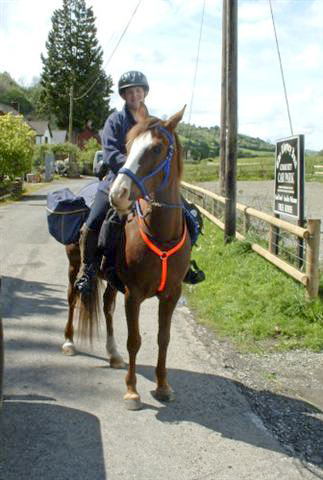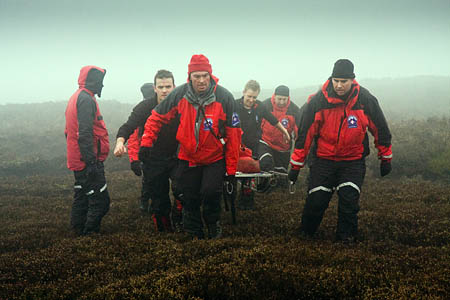Walkers and other outdoors enthusiasts in Britain could soon be allowed to use satellite safety transmitters for the first time.
The use of personal locator beacons has long been a contentious subject, with arguments both for and against, but the Government’s official telecommunications body Ofcom is recommending their introduction be allowed.
As long ago as January 2008, grough reported the campaign, led by Jenni Miller of Equine Ramblers, to allow the safety devices’ use on land in the UK. Ms Miller suffered a fall from her horse while on a six-day trek.
Her experience led her to start the campaign to change the rules to allow walkers, horse riders, mountaineers, climbers and mountain bikers to use PLBs on land. At present, their use is restricted to marine and aviation travel.

Jenni Miller, and early advocate of the use of PLBs in Britain
PLBs use the Cospas-Sarsat emergency system that can transmit a signal in the event of accident or injury to a group of orbiting satellites which will then alert emergency services.
Ofcom has launched a consultation and is asking for views on the subject, but says it believes it is time to allow the use of the units on land. In official terms, this would mean they become ‘licence-exempt’.
In its consultation document, the Government body says: “We are proposing to permit their licence-exempt use on land in the UK.
“The proposal has the consent of the United Kingdom Search and Rescue Operators Group, including the Association of Chief Police Officers, the Association of Chief Police Officers in Scotland, the Ministry of Defence, the Maritime and Coastguard Agency and the Civil Aviation Authority.
“Similar types of emergency radio beacons have already been authorised for use onboard ships and aircraft for a number of years and other devices for notifying distress on land via satellite networks are already permitted in the UK.”
The Ofcom statement continues: “In many remote areas there is limited mobile telephone network coverage which can present a serious risk in an emergency or serious distress situation, eg a lone worker operating in difficult and remote terrain who is badly injured, a mountaineer requiring rescue or a hiker in the hills who has lost his map or navigation tools and is in danger.
“In these situations a PLB transmitting location information could be triggered which would greatly assist search and rescue services in locating the individual quickly.”
Ofcom is recommending only beacons with a secondary GPS transceiver are used since the Cospas-Sarsat system would only give an accuracy of about 5km (3 miles) whereas the second GPS signal would allow searchers to pinpoint the PLB to within a few metres.
The official recommendation is that all PLBs should be registered, with details of the owner, address and emergency telephone numbers.
Ofcom acknowledges there it the risk of false alarms, though many modern units have a feature that delays distress signals for a few seconds, allowing the cancelling of inadvertent activation.
“A potential increase in the number of PLB devices in the UK raises the risk in the number of false alerts,” the report says. “If a PLB is activated a cost may be incurred by public authorities and search and rescue organisations, in ascertaining whether or not it is a false alert. Nevertheless, the main organisations which would be impacted support our proposal to licence exempt the use of PLBs on land.”
Ofcom says that, on balance, the introduction of the beacons for outdoor enthusiasts would be helpful. “The ability to identify and locate people quickly in an emergency has a number of benefits.
“A PLB can enable search and rescue organisations to reduce the time taken to search for the distressed party and to make a measured response, thereby making more efficient use of valuable search and rescue resources,” it said. “This can reduce the risk of loss of life or serious harm. In addition, the ability to determine the search location can save significant costs for search and rescue organisations when carrying out such an operation.
“Although additional costs may be incurred by search and rescue organisations we believe that the benefits to citizens overall will outweigh these costs.”
Ofcom’s consultation ends on 16 June and submissions can be made online. It expects to have draft regulations by July 2011 and new regulations in place by November 2011.

James Grove
22 October 2011They should be license free, but registration should be copulsory. There should also be some strict guidence on there use and that the registered owner has responsobilty to keep records up to date. Other devices are already available such as SPOT Messenger.
Penelope Bonvoisin
09 November 2011I'm on this web site because I'm looking for a PLB for an elderly friend of mine who walks alone every day on Dartmoor (where there are many places without mobile phone recepetion). After he had a recent fall, I decided to get him a PLB - as a sailor I am familiar with EPIRBs in the marine environment. I am amazed to learn that it is still not legal to use such a device on land in this country. I know that there are countless instances of mis-use of the emergency services but surely it's time to get this issue sorted out. Any ideas what would be suitable for my friend in the meantime?
Bob
09 November 2011The wheels of progress are turning slowly with regard to land-based PLBs. In the meantime, you could look into the Spot system, which can be used legally in the UK: http://www.findmespot.eu/en/
Bob, editor
Anthony Dacko
11 November 2011I would like to follow on with Bobs comment the Spot messenger are subscription based devise.
The power out put is in the miliwatts they had a recall not so long ago people have reported some times the tracking signal is not working that could also affect the Emergency signal as well as they use the same satellites.
If you do not keep up your subscription every year you will have know way of sending a emergency signal with spot.
The Benefit of a PLB's is they are dedicated to SAR work on the 406Mhz SAR satellite frequency.
The out put power of a PLB is often 5 watts much more powerful signal in a emergency,
With a PLB you have no subscription to pay,
Don't waste your money on a Spot messenger go for a real life saver like the Fast Find 210 GPS enabled PLB this is the version I have my self it won't be long now before the law allows the use on the hills.
See link for more information: http://www.fastfindplb.com/en/index.php
Regards Anthony Dacko.